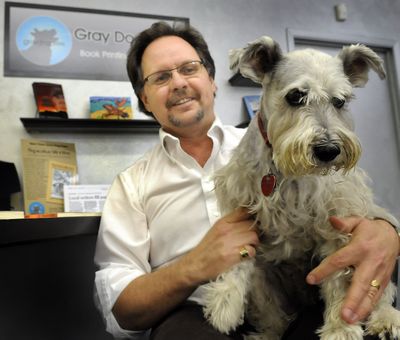Freedom of the Gray Dog Press
With a print shop on site, new publishing house shows it can make it, even without huge sales

Gray Dog Press doesn’t exactly look like Random House from the outside – it’s housed in Ditto’s Print and Copy Center in Lincoln Heights Shopping Center.
Yet the newest book publisher in Spokane has already produced 10 books under its own imprint since last fall, and has another 12 ready to go.
In addition, it has published two volumes of its own literary journal, SpokeWrite, The Spokane-Coeur d’Alene Journal of Art and Writing.
The Gray Dog Press is not a vanity press, a “subsidized press,” an e-publisher, a “print-on-demand” press or any other kind of hybrid. It’s a classic, traditional book publisher that signs authors to contracts, pays them royalties and takes the risks if not enough books sell.
Russ Davis, who runs Gray Dog Press, makes it all work in a tough climate for print of any kind, mainly because he keeps the overhead exceptionally low. Davis is the only editor and the company prints the books right there on humming machines at Ditto’s.
“We’re our own production facility – we don’t have to sell a lot of books,” he said. “To make a profit, we usually only have to sell 200 or 300 copies.”
That’s a nice, realistic sales number for a regional book by a local author, at least the kind of book that has at least some appeal beyond family and friends.
And some books are selling better than that. Two in particular are doing quite well: “The Trail of the Coeur d’Alenes Unofficial Guidebook” by Estar Holmes, and “A Cowgirl Remembers When …,” a memoir of the ranch/cowgirl life in Washington by Dawn Nelson.
Both are already profitable just a few months after publication, mainly because their authors go out and help sell the books themselves.
Gray Dog Press officially launched last fall, but it evolved for years before that.
Davis began his career in petroleum exploration and then computer programming. About 15 years ago, he and his wife, Julie Davis, decided to make a career change and get into the printing-copying business on Spokane’s South Hill.
The business took off quickly. It eventually became Ditto’s and moved to its present location.
Davis had always been interested in literature and writing. Whenever he could take an elective in college, it was always English literature. So he bought a small bookbinding machine for the shop and began dabbling in printing books on contract.
When a writer had a book they wanted printed, he would print, let’s say, 50 copies and sell them to the writer. This followed the self-publishing model, in which the writers served as their own publishers and Davis simply printed the books for a fee.
“At first, I was reluctant to go fully into publishing because it creates a long-term fiduciary relationship with the author,” he said. “A book copyright is good for 75 years.”
As he printed more and more self-published books, he gained more knowledge about the publishing business as a whole. Then came the economic downturn, which hurt the copy business. Davis started thinking about ways to create more business and he realized it was time to go all the way into book publishing.
It was not only good for business, it was filling a need in the region. From attending meetings of writers’ groups, he realized there was plenty of demand from authors.
He named the company after his gray miniature schnauzer, Zak, and started soliciting manuscripts.
Davis gets at least six to eight submissions a week. He divides them into two categories. The books that have appeal beyond family and friends, which can reasonably expect to sell a few hundred copies, he accepts for the Gray Dog Press imprint.
The others go into the self-publishing category, meaning that he will contract to print them, but the author is the publisher and takes the risk if they don’t sell.
This spring, Davis also started the Gray Dog’s own literary journal, “SpokeWrite.” He had come to realize that there are hundreds of writers in the Spokane region who have a good short story, but not enough material for a book. So he wanted to give them – and Gray Dog – a showcase.
The contributors don’t get paid, but they get something most writers crave even more: the chance to say they’ve been published.
Isn’t Davis worried about the future, in a digital world that is supposedly going to make print obsolete?
“People always want a good book,” he said.